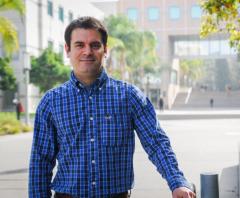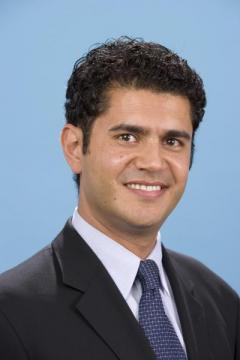Take Note: Three recent awards advance research in healthcare, transportation and materials science
 Ahmad Falahatpisheh has been awarded a $50,000 pre-doctoral fellowship from the American Heart Association. Falahatpisheh, a mechanical and aerospace engineering Ph.D. candidate in the lab of Dr. Arash Kheradvar, assistant professor in The Edwards Lifesciences Center for Advanced Cardiovascular Technology, works on computational and experimental cardiac fluid dynamics. His project involves modeling the flow inside the right section of the heart of patients with a complex congenital heart malformation called tetralogy of Fallot (TOF). Children born with TOF require corrective surgery within the first year of life. Surgical repair improves survival but is not curative, and these children need intense follow-up with specialists as their lives progress. Repeat surgery is complex and must be well-timed to ensure the number of procedures is minimized. Falahatpisheh’s project will try to associate clinical and fluid dynamics parameters to provide valuable insights into the effect of abnormal variation, and to improve understanding of the relationship between the changes in the function and the flow patterns in the right heart of these patients. “Through this study, it may be possible to aid in determining the optimal time for re-operation as the heart grows to an adult size,” says Falahatpisheh. “This would be of considerable clinical significance given the scope and depth of this problem.”
Ahmad Falahatpisheh has been awarded a $50,000 pre-doctoral fellowship from the American Heart Association. Falahatpisheh, a mechanical and aerospace engineering Ph.D. candidate in the lab of Dr. Arash Kheradvar, assistant professor in The Edwards Lifesciences Center for Advanced Cardiovascular Technology, works on computational and experimental cardiac fluid dynamics. His project involves modeling the flow inside the right section of the heart of patients with a complex congenital heart malformation called tetralogy of Fallot (TOF). Children born with TOF require corrective surgery within the first year of life. Surgical repair improves survival but is not curative, and these children need intense follow-up with specialists as their lives progress. Repeat surgery is complex and must be well-timed to ensure the number of procedures is minimized. Falahatpisheh’s project will try to associate clinical and fluid dynamics parameters to provide valuable insights into the effect of abnormal variation, and to improve understanding of the relationship between the changes in the function and the flow patterns in the right heart of these patients. “Through this study, it may be possible to aid in determining the optimal time for re-operation as the heart grows to an adult size,” says Falahatpisheh. “This would be of considerable clinical significance given the scope and depth of this problem.”
 Professor Kenneth Mease, mechanical and aerospace engineering, has received a seed grant of $50,160 from NASA via University Affiliated Research Center run by UC Santa Cruz. The grant will fund Mease’s research project titled Strategic Air Traffic Flow Control via Aggregate Modeling. The project’s goal is to plan traffic flow over the U.S. two to eight hours ahead. Mease’s approach is to model air traffic as a fluid flow rather than accounting for each individual aircraft. Aircraft are aggregated into cells covering the national airspace, and the model keeps track of aircraft density in each cell and the flow between cells. Given the desired flight plans of all the aircraft that will be entering the system, the flow of aircraft is controlled by departure delays and re-routing. There is a need for such control when weather conditions reduce the aircraft capacity of certain cells. “This is high-level planning,” says Mease. “The objective is to minimize overall arrival delays while meeting the aircraft performance and airspace capacity constraints.” Flight delays currently cost the U.S. economy billions of dollars annually.
Professor Kenneth Mease, mechanical and aerospace engineering, has received a seed grant of $50,160 from NASA via University Affiliated Research Center run by UC Santa Cruz. The grant will fund Mease’s research project titled Strategic Air Traffic Flow Control via Aggregate Modeling. The project’s goal is to plan traffic flow over the U.S. two to eight hours ahead. Mease’s approach is to model air traffic as a fluid flow rather than accounting for each individual aircraft. Aircraft are aggregated into cells covering the national airspace, and the model keeps track of aircraft density in each cell and the flow between cells. Given the desired flight plans of all the aircraft that will be entering the system, the flow of aircraft is controlled by departure delays and re-routing. There is a need for such control when weather conditions reduce the aircraft capacity of certain cells. “This is high-level planning,” says Mease. “The objective is to minimize overall arrival delays while meeting the aircraft performance and airspace capacity constraints.” Flight delays currently cost the U.S. economy billions of dollars annually.
 Ali Mohraz, assistant professor in chemical engineering and materials science, has received a Distinguished Young Rheologist award from TA Instruments, a manufacturer of analytical instruments for thermal analysis, rheology, and microcalorimetry. The award is an instrument grant, in the form of a $50,000 rheometer (a device that measures the way a liquid, suspension or slurry flows in response to applied forces). Mohraz looks at how soft materials (pastes and gels) respond when subjected to large external forces and how the fluid’s underlying microstructure evolves as the material deforms. The deformation behavior of such materials has important implications for technological applications. “This new rheometer will be the most advanced in my lab and will have the sensitivity and capabilities needed for modern research,” says Mohraz.
Ali Mohraz, assistant professor in chemical engineering and materials science, has received a Distinguished Young Rheologist award from TA Instruments, a manufacturer of analytical instruments for thermal analysis, rheology, and microcalorimetry. The award is an instrument grant, in the form of a $50,000 rheometer (a device that measures the way a liquid, suspension or slurry flows in response to applied forces). Mohraz looks at how soft materials (pastes and gels) respond when subjected to large external forces and how the fluid’s underlying microstructure evolves as the material deforms. The deformation behavior of such materials has important implications for technological applications. “This new rheometer will be the most advanced in my lab and will have the sensitivity and capabilities needed for modern research,” says Mohraz.
